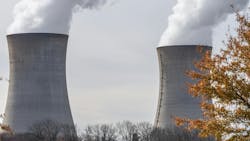More Nukes: DOE Pilot Seeks New Advanced Reactor, Fuel Technologies Domestically
The U.S. Department of Energy is pushing ahead with a new pilot program to accelerate development of new advanced nuclear power generation including small modular reactors (SMR).
The DOE program also seeks to strengthen domestic supply chains for nuclear fuel. Most of the uranium used in nuclear power generation is imported, led by Canada, Kazakhstan and Russia.
The U.S. nuclear energy power plant fleet of 94 operational units generates 18% of total utility-scale electricity and about half of the carbon-free power delivered nationwide. However, no SMRs have been built or commissioned in the U.S., and the Vogtle 3 and 4 expansion is the last conventional-scale nuclear capacity completed in at least a decade.
The Energy Department launched this new reactor program in June to expedite testing of advanced reactor designs. The current process involving the federal Nuclear Regulatory Commission takes multiple years to reach approval levels and start construction.
Uranium is a primary fuel material for nuclear fission and is found all over the world, including the U.S. This nation, however, peaked in domestic uranium purchases in the early 1980s, focusing more on imports since then.
Applicants to the DOE program will be responsible for all costs associated with the construction, operation, and decommissioning of an advanced nuclear fuel line, as well as the procurement of all nuclear material feedstock. The selections will be based on technological readiness, established fuel fabrication plans, and financial viability.
While the advanced nuclear fuel lines will serve for research, development, and demonstration purposes, seeking DOE authorization of the facilities will help release private funding and provide a quick approach to enable future commercial licensing activities for potential applicants. While initial applications are due by August 15, subsequent applications will be allowed on a rolling basis.
Earlier this week, President Trump appeared in an energy forum at Carnegie Mellon University and promised federal support to push for more gas-fired and nuclear power generation to meet the future demand from growing artificial intelligence and data center capacity. The federal funding could reach anywhere from $70 billion to $90 billion to support development of baseload power generation for AI-enabled computing installations.
Digital infrastructure companies which have signed onto conventional nuclear power purchase deals or future SMR projects include Microsoft, Google, Oracle, Meta and Amazon Web Services.
